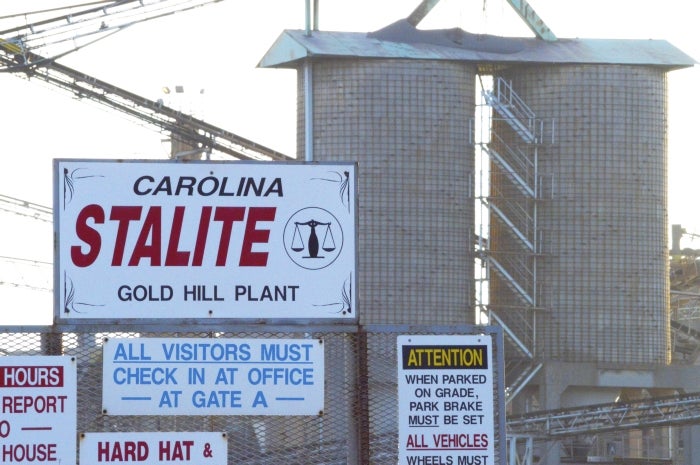Gold Hill area companies, farmer cited for environmental violations
Published 12:10 am Sunday, January 18, 2015

- Josh Bergeron / Salisbury Post - Carolina Stalite was one of three different entities cited in December by the North Carolina Department of Environmental quality for an unlicensed dump site near Gold Hill.
The North Carolina Department of Environmental Quality in December cited two businesses near Gold Hill and a local farmer with environmental violations concerning a non-permitted dump site.
Three separate divisions of DENR cited Carolina Stalite, Hammill Construction Co. and farmer Phil Cline for several environmental violations, including: operating a non-permitted waste site and allowing the stored waste material to enter a nearby stream. The site is in Cabarrus County and near Gold Hill.
The dump site, approximately 4 acres in size, was allegedly used to store emission control dust, described by a Carolina Staylite employee as a lime equivalent. Lime is a material used by farmers to help balance the pH of soil.
Certified letters detailing violations were sent to both companies and Cline, who is an applicant for biosolid material from Charlotte-Mecklenburg.
When asked about the violations, Cline said Hammill Construction, which hauled the lime-like material from Carolina Stalite, had been dumping on his property for about 10 years. Cline said he didn’t charge Hammill Construction or Carolina Stalite to dump the material on his property.
“You can apply lime on the ground,” Cline said. “I told them to go ahead and it saved them money. Lime is something you use to put on farmland. This is the same stuff.”
Plant Engineer of Carolina Stalite’s Gold Hill facility Tim Agner, likewise, said the leftover material from his facility is beneficial to use on soil.
“It’s been tested and approved by North Carolina Department of Agriculture as an agricultural lime equivalent to enhance soils,” Agner said. “Unfortunately, we’ve recently been made aware of an un-permitted use and are working to rectify the matter.”
A letter dated Dec. 19 from DENR’s Division of Waste Management states the 4-acre dump site contained more than emission control dust. Other waste at Cline’s site included “plastic wrap, plywood, dimensional cut lumber, large industrial poly bulk bags and a crushed metal barrel on the northeastern slope of the disposal site,” the letter states.
Approximately 750 feet of an unnamed tributary leading into Little Buffalo Creek was filled with the emission control dust and the tributary’s pH level was measured at a non-standard amount, according to another letter, dated Dec. 9, from DENR’s Division of Water. In the letter, Regional Supervisor for Water Quality Operations Michael Parker writes that 22 feet of emission control dust built up on the bottom of the stream. In the same letter, Parker writes that the built-up waste “resulted in the loss of use of the channel for aquatic wildlife.”
Downstream from the emission control dust, according to Parker’s letter, the stream’s pH measured 9.5 SU, which is the equivalent of baking soda. Upstream from the waste, the stream measured a pH of 4.3 SU, which is close to the pH of black coffee.
In a section labeled “required response,” Parker says “the fill shall be removed from the stream channel and the stream restored to its natural dimension, pattern and profile,” Parker also tells both companies and Cline to follow an approved erosion plan, prevent the waste from moving downstream during its removal and provide locations of other areas being used as disposal sites.
Parker’s requirements are just a few listed in DENR’s letters. Disposing of waste at an approved facility, conducting a waste analysis, installing erosion and sediment control devices and ceasing all hauling activities to the site are items listed in other letters as “required response.”
The letters list multiple fine amounts. For example, Parker’s letter includes a maximum fine of $25,000 per day can be enforced for each violation. A letter from the Division of Waste Management states a maximum of $15,000 per day can be assessed for each violation. A $5,000 -per-day fine for each violation is listed on a Division of Land Quality letter.
The dump site was reported to DENR by Gold Hill residents, many of whom expressed anger during a November 2014 public hearing about Cline’s pending permit to receive biosolid material, or sludge, from Charlotte Mecklenburg Utilities.
Dr. Lance Riley, who has a Ph.D. in aquatic science from the University of Florida, said he helped facilitate the complaint to DENR and is concerned about how the material on Cline’s property might affect the nearby wildlife. Riley has been an outspoken opponent of Charlotte-Mecklenburg’s proposal to put sludge on farmland near Gold Hill.
DENR representatives met with Cline this week to discuss the future of the non-permitted dump site.
In an email, Parker said: “Both the Division of Waste Management and the Division of Water Resources are working with Mr. Cline and the other parties involved to get this matter resolved as soon as possible.”
It’s unclear if restoration activities, such as removing the emission control dust from the stream, have started. A DENR representative did not respond to requests for comment about this week’s meeting by press time on Saturday.
Contact reporter Josh Bergeron at 704-797-4246



